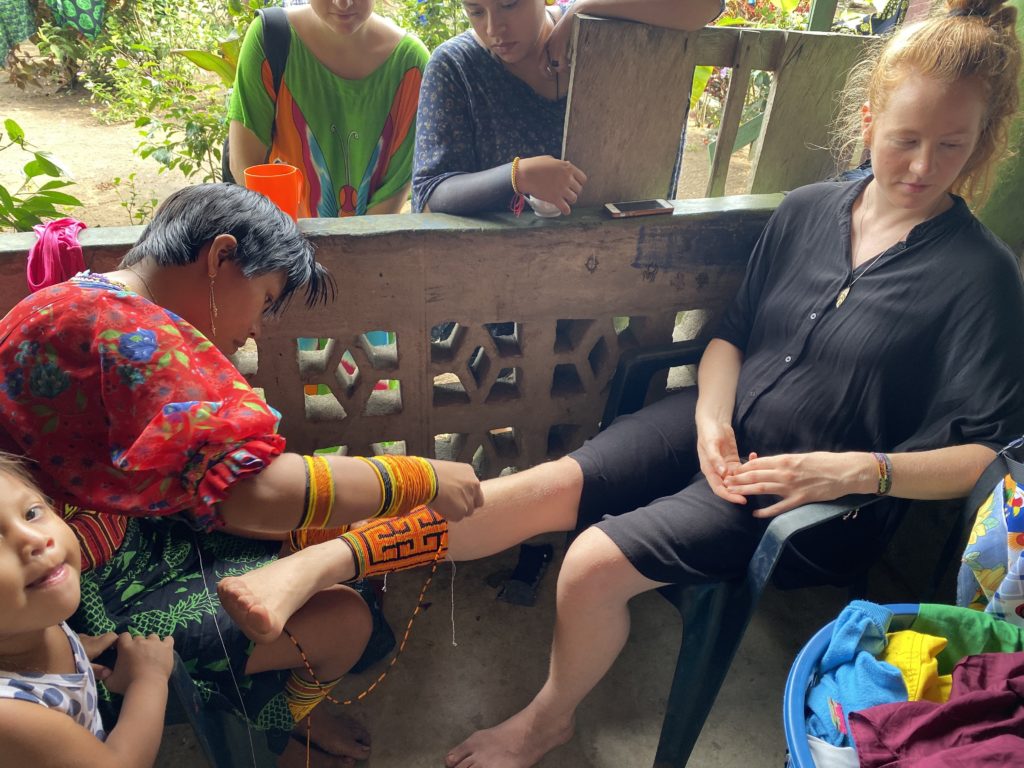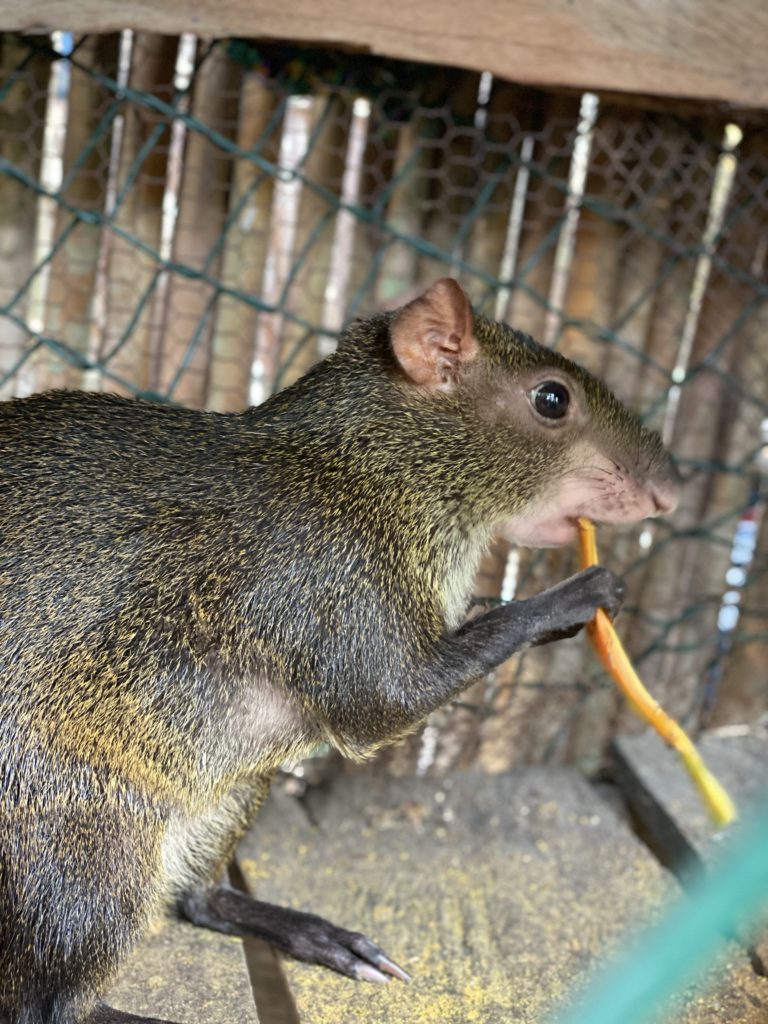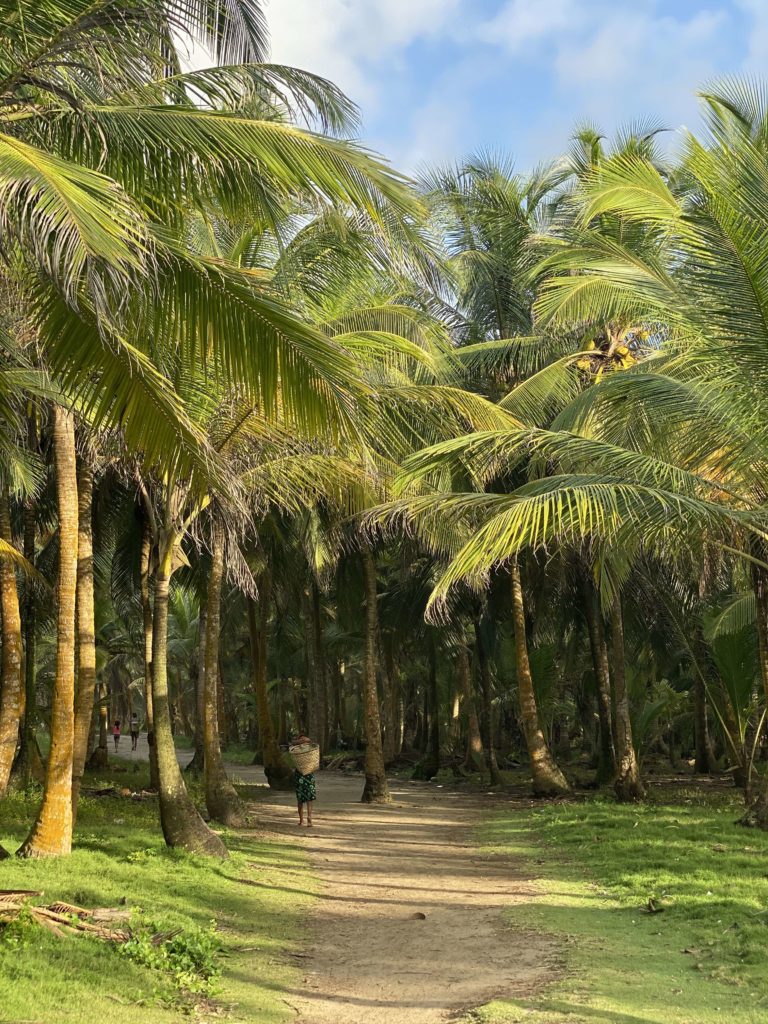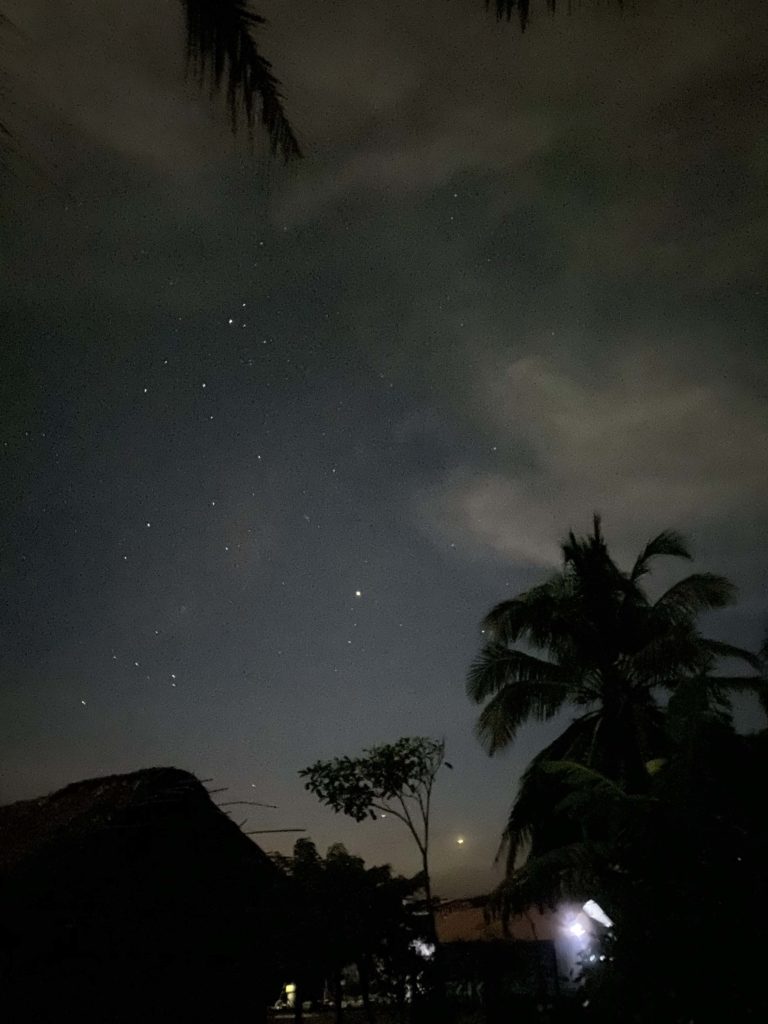The mosquito net has been successful in keeping out many other things other than mosquitos, including the house rats that regularly have a dance party on our roof beams.
The jagua is a bit smudged but largely intact. Then I notice I’ve somehow printed the inside of my palm with half a frog print. It’s… kinda cool. Could have been worse. I could have printed my face! Caroline quips, ‘A frog on the palm is worth two on the arm.’
She says that her husband once finished the proverb, “A bird in the hand… why are you holding a bird in your hand? It’s disgusting. Get rid of it!” Which makes me think of real-world use of proverbs in urban settings. It’s hard enough to catch a damned chicken!
The shape of the beach has changed because of the storm. There used to be a wide sandy area where a volleyball net was set up. That has been completely eradicated. And further down, the ocean has swallowed so much sand it has come right up to the creeping vines. Must be nice to have your beach remodeled every few months or so.
My mola shirt is ready! The pattern on the collar and the cuffs is really beautiful. It’s a little too fitted on the sides, so Aida is going to take it out a bit. But the length is perfect.

Maria is being fitted today with a pair of leg uinnis. It’s a painstaking process to fit the beads one by one onto a string and then to make sure the patterns align as the rows build up. They had to take measurements of her leg, because the circumference isn’t constant. Usually, the uinnis are worn for a month at a time. Is this cultural appropriation or honouring culture? It isn’t something bought at a tourist outlet and is made with the full permission of the sahilas. In fact, it generates income and also becomes a talking point about the Guna and their way of life. It’s a bit of a moral conundrum though, as it’s something not for her and yet customised just for her.
Someone in the village has a ñeque, and we head over to see it. It’s caged up but seems happy enough to nibble on the papaya strips and potatoes we have brought. This was the beautiful mouse we have been meaning to visit, although at first glance it seems more like a lanky desert rat. It has legs for days, long claws and an elongated snout. Fascinating!

A line from Bachelard quoting Pierre-Jean Jouve, “Poetry is a soul inaugurating a form.” Bachelard explains, “The soul inaugurates. Here it is the supreme power. It is human dignity. Even if the “form” was already well-known, previously discovered, carved from “commonplaces,” before the interior poetic light was turned upon it, it was a mere object for the mind. But the soul comes and inaugurates the form, dwells in it, takes pleasure in it.”
After this residency, we will all head into certain uncertainties. I return with natural gifts for friends; seeds, pieces of wood, shells, small rocks. Reminders to me that friendships are organic, living things and that a gift can also be an everyday object shaped by the imagination into something uncommon. Something akin to the life of an image.
The water is coming back on. Very slowly. So we fill up the large container because it may not stay on forever.
Everyone decides to go for a swim in the river simply because the day is too beautiful to ignore. The water is cold and rejuvenating and I swim to the other side, the one that has two shores, on one side the river and the other, the ocean.
The river shore deposits seeds and long palm fronds and driftwood. The ocean brings plastic, though this afternoon, it is trackless, the sand unbroken. I finally find a maracas seed. It gets wet on the swim back, but hopefully it will dry out.
Packing is hard when you’re still finding things on the beach, but I think that I shall give some of them away as gifts.
Everyone does a quick interview with Luz and Luis about their time here. It’s for the La Wayaka archives but it’s also a chance for me to articulate what I’ve been doing here.

It’s brilliant weather, so I go for a walk and capture the light down Coconut Way. There’s hasn’t been light like this most days during the golden hour, so today has been a blessing. As soon as I get back, Charlotte is looking for a buddy to go walking with. Everyone is still packing, so off I go again. She tells me about the La Wayaka residency in the Atacama Desert of Chile, which she just finished, and it sounds like an absolutely transcendental experience. On another note, I am really going to miss aligning my days to the natural rhythms of the light.

Luz calls us out to see the evening sky. Venus, Mars and Saturn are aligned, just like on Zlatan’s mobile. It’s incredibly significant to see this but interpretation is a complicated beast and it means different things to different people.
I write a poem for everyone. Seven poems in an evening is tough, but I’m glad everyone likes their poems.
The differences between the village and the city are never more stark than here in Armila. Here, the community is close-knit. Everyone knows your name, your family history and all your flaws and glories. But everyone also takes care of each other. Community anywhere is beautiful. Community connected to the land is nurturing.

There is so much value to Nachito growing up here instead of the city. According to Nacho, villagers who have worked in the city said that they were miserable and didn’t have any friends. Cities are designed for isolation; for maximum productivity and minimum happiness.
We never got to sit in on a Congress meeting, but apparently there was some drama tonight. The foreman who has been in charge of the crew building what is to be the biggest house in the village was hauled up before the congress for being, well, a horndog. Apparently, he had been doing the deed with a few women around the village and the sahilas frown upon such loose behaviour. It’s not so much about being married but about being faithful. He had been previously warned and fined for this. And now he did it again, with the same woman that he was caught with before. The poor woman was shamed because she was exposed. The man was going to be fined again and expelled from the community, as he isn’t from Armila. But before that judgment was made, the woman was asked if she loved the man and wanted to marry him. And she said yes. The sahilas asked the man the same question. And he said no. That sent everyone into a tizzy.







